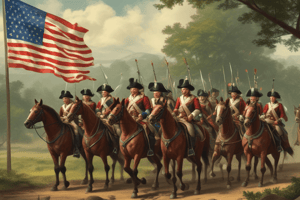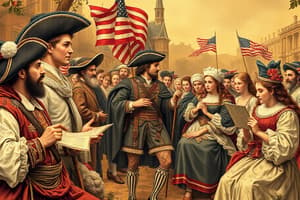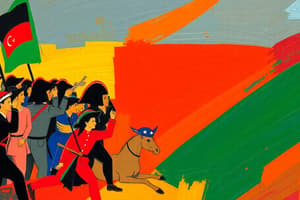Podcast
Questions and Answers
What was the main purpose of the Proclamation of 1763 and how did it affect the relationship between the British and the colonies?
What was the main purpose of the Proclamation of 1763 and how did it affect the relationship between the British and the colonies?
The Proclamation of 1763 aimed to limit colonial expansion westward, causing resentment and anger among colonists towards British authority.
How did the concept of 'taxation without representation' serve as a rallying cry for the American colonists?
How did the concept of 'taxation without representation' serve as a rallying cry for the American colonists?
'Taxation without representation' highlighted the colonists' frustration over being taxed by a government in which they had no political voice, fueling their desire for self-governance.
Describe the significance of the Boston Massacre in shaping public opinion about British rule.
Describe the significance of the Boston Massacre in shaping public opinion about British rule.
The Boston Massacre became a symbol of British oppression and fueled anti-British sentiment, galvanizing colonists to resist further British control.
What was the outcome of the Boston Tea Party and its importance in the context of colonial resistance?
What was the outcome of the Boston Tea Party and its importance in the context of colonial resistance?
Explain the role of the First Continental Congress in the American Revolution.
Explain the role of the First Continental Congress in the American Revolution.
What were the implications of the Declaration of Independence for the American colonies?
What were the implications of the Declaration of Independence for the American colonies?
How did the Battle of Saratoga influence the course of the American Revolution?
How did the Battle of Saratoga influence the course of the American Revolution?
What challenges did the Continental Army face during the winter at Valley Forge?
What challenges did the Continental Army face during the winter at Valley Forge?
Discuss the significance of Enlightenment ideas in the justification for the American Revolution.
Discuss the significance of Enlightenment ideas in the justification for the American Revolution.
In what ways did colonial resistance evolve into a more organized movement leading up to the Revolution?
In what ways did colonial resistance evolve into a more organized movement leading up to the Revolution?
Flashcards are hidden until you start studying
Study Notes
American Revolution
Causes of the Revolution
- Proclamation of 1763: restricted American settlement west of the Appalachian Mountains, leading to resentment among colonists
- Taxation without representation: British imposition of taxes (e.g., Stamp Act, Townshend Acts) without giving colonists a say in government
- Colonial resistance: formation of Sons of Liberty, boycotts, and protests against British rule
- Enlightenment ideas: influence of thinkers like John Locke, who emphasized individual rights and liberties
Key Events of the Revolution
- Boston Massacre (1770): deadly clash between British soldiers and American colonists
- Boston Tea Party (1773): colonists' protest against British taxation by dumping tea into harbor
- Intolerable Acts (1774): British responses to colonial resistance, including closure of Boston Port and quartering of soldiers in homes
- First Continental Congress (1774): meeting of colonial representatives to coordinate response to British actions
- Battle of Lexington and Concord (1775): first military engagement of the Revolution
- Declaration of Independence (1776): formal statement of American sovereignty and separation from Britain
- Battle of Saratoga (1777): decisive American victory that secured French support
- Valley Forge (1777-78): harsh winter during which American forces regrouped and trained under Washington's leadership
- French Alliance (1778): formal agreement of military and financial support from France
- Yorktown (1781): final major battle, resulting in British surrender and effective end of the war
Key Figures of the Revolution
- George Washington: military leader and first president of the United States
- Thomas Jefferson: primary author of the Declaration of Independence
- John Adams: early advocate for independence and negotiator of French Alliance
- Patrick Henry: famous for "Give me liberty or give me death" speech
- Benjamin Franklin: diplomat, statesman, and scientist who helped secure French support
Causes of the Revolution
- Proclamation of 1763: Limited colonial expansion beyond the Appalachian Mountains, causing widespread frustration among settlers.
- Taxation without representation: Colonists faced taxes imposed by Britain, such as the Stamp Act and Townshend Acts, without having elected representatives to voice their concerns.
- Colonial resistance: Groups like the Sons of Liberty emerged to organize protests, boycotts, and confrontations against British control.
- Enlightenment ideas: Philosophical influences from thinkers like John Locke introduced concepts of individual rights, governance by consent, and the inherent rights of citizens.
Key Events of the Revolution
- Boston Massacre (1770): A violent encounter where British troops fired on a crowd of colonists, resulting in multiple deaths and heightened tensions.
- Boston Tea Party (1773): A major protest in which colonists, disguised as Native Americans, dumped an entire shipment of tea into Boston Harbor to oppose British tea taxes.
- Intolerable Acts (1774): A series of punitive measures enacted by Britain following the Boston Tea Party, which included closing Boston's port and requiring colonists to house British soldiers.
- First Continental Congress (1774): Gathering of delegates from 12 colonies to address grievances against the British government and coordinate collective action.
- Battle of Lexington and Concord (1775): Marking the first military clashes of the Revolution, these battles ignited armed conflict between Britain and the American colonies.
- Declaration of Independence (1776): A landmark document declaring the colonies' independence from Britain and outlining fundamental rights, authored primarily by Thomas Jefferson.
- Battle of Saratoga (1777): A pivotal confrontation leading to an American victory, which significantly influenced France to ally with the colonies.
- Valley Forge (1777-78): Site of the Continental Army's winter encampment where troops, under Washington's command, endured severe conditions but emerged more disciplined.
- French Alliance (1778): A crucial military and financial partnership formalized between the American colonies and France, bolstering the revolutionaries' efforts.
- Yorktown (1781): The decisive battle where Gen. Cornwallis's British forces surrendered to American and French troops, effectively concluding the Revolutionary War.
Key Figures of the Revolution
- George Washington: Commander of the Continental Army; later became the first President of the United States, symbolizing leadership and unity.
- Thomas Jefferson: Principal author of the Declaration of Independence and a key advocate for democratic principles and individual rights.
- John Adams: A prominent advocate for independence and pivotal in negotiating the French Alliance for American support during the war.
- Patrick Henry: Renowned for his passionate declaration, "Give me liberty or give me death," which rallied support for the revolutionary cause.
- Benjamin Franklin: An influential diplomat and statesman whose efforts were vital in securing French assistance; also known for his scientific contributions.
Studying That Suits You
Use AI to generate personalized quizzes and flashcards to suit your learning preferences.




